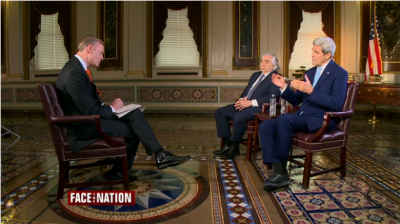Iran Doesn’t Trust US Inspectors–and Shouldn’t
It’s simple, Face the Nation

Face the Nation‘s John Dickerson grilling cabinet members Ernest Moniz and John Kerry about a nonexistent promise to get Iran to agree to inspections “anytime, anywhere.”
When Face the Nation‘s John Dickerson (7/19/15) interviewed Secretary of State John Kerry and Energy Secretary Ernest Moniz about the Iran deal, his second question—after “when [Americans] see Iranians dancing in the street with this deal, why shouldn’t they be suspicious about it?”—was about the fact that it doesn’t give the United States the ability to inspect anyplace in Iran with no notice. Dickerson cited the Israeli prime minister:
One of the real opponents of this deal, Prime Minister Benjamin Netanyahu, said of the 24-day waiting period on inspections, he said, you wouldn’t tell a drug dealer, give them 24-day notice. They would just flush the drugs down the toilet.
Does he have a point?
Moniz made the obvious point that you can’t actually flush a secret nuclear program “down the toilet”:
I don’t think that’s really an option here with nuclear materials…. We feel very confident in the capability of IAEA with environmental sampling to detect any nuclear activity very, very long after it has occurred.
But Dickerson persisted, turning to Kerry: “What happened, Mr. Secretary, with anytime, anywhere?” To which the secretary of State responded: “There’s no such thing in arms control as anytime, anywhere. There isn’t any nation in the world, none, that has an anytime, anywhere.”
But, persisted Dickerson, “Ben Rhodes, deputy national security adviser, said in April you will have anywhere, anytime, 24-7 access.”
That’s not actually what Rhodes said; when asked about “anywhere, anytime” by CNN‘s Jake Tapper (4/6/15), he responded, “Well, Jake, first of all, under this deal, you will have anywhere, anytime 24/7 access as it relates to the nuclear facilities that Iran has.” In other words, anywhere that’s a nuclear facility–not anywhere in the country that the US happens to be curious about. (Rhodes clarified this the same day in an interview with Israeli TV—see Politifact, 7/19/15.) Kerry and Moniz said pretty much the same thing to Dickerson.
This obviously left Dickerson unsatisfied: “We will have to move on there,” he said, before going on to ask a question about how the deal will not prevent the “terrorist nation” of Iran from having a conventional military.
Perhaps the discussion would have been more satisfying—if not for Dickerson, then for viewers—if anyone had acknowledged the reality that it would be foolish for Iran to accept unlimited inspections at any location on its territory because the United States has in the past used inspections as a cover for espionage that facilitated military attacks. As Jon Schwarz put it in a piece in The Intercept (7/15/15):
All countries have things they legitimately want to hide, such as conventional military secrets and the security procedures of their leaders…. During the 1990s the US demonstrated with Iraq that it would routinely abuse the weapons inspections process in order to uncover such legitimate secrets—and use them to target the Iraqi military and try to overthrow the Iraqi government.
These efforts are not exactly a secret to US corporate media; the Washington Post and Boston Globe jointly broke the news that the UN’s UNSCOM inspection program in Iraq had been used for US military espionage on January 6, 1999 (written up by Seth Ackerman in FAIR’s Extra!, 3-4/99, 11-12/02). In the Globe‘s words, UNSCOM concealed “an ambitious spying operation designed to penetrate Iraq’s intelligence apparatus and track the movement of Iraqi leader Saddam Hussein.”
The Post (1/17/99) later revealed that intelligence garnered through the UNSCOM spying was used to bomb military targets in Iraq, with military analyst William Arkin writing:
National security insiders, blessed with their unprecedented intelligence bonanza from UNSCOM, convinced themselves that bombing Saddam Hussein’s internal apparatus would drive the Iraqi leader around the bend.
Rather than apologizing for this misuse of the inspections process, Washington insiders defended it. USA Today (3/3/99) reported:
Experts say it is naive to believe that the United States and other governments would not have used the opportunity presented by the UN commission to spy on a country that provoked the Persian Gulf War.
So it wasn’t considered debatable at the time—though a few years later, when the US was gearing up for an invasion of Iraq, US media started treating it as an allegation made by Iraq rather than an actual operation that had been exposed by leading US papers (as Ackerman documented—Extra!, 11-12/02).
And now that the US is trying to get inspectors into another Mideast country, no one in a position to either ask or answer questions on elite news shows like Face the Nation even recalls the scandal—or, if they do, they’re too polite to mention it.
But you can be certain that Iran remembers it.
Jim Naureckas is the editor of FAIR.org.
Messages to Face the Nation can be send to [email protected] (or via Twitter @FaceTheNation). Please remember that respectful communication is the most effective.

